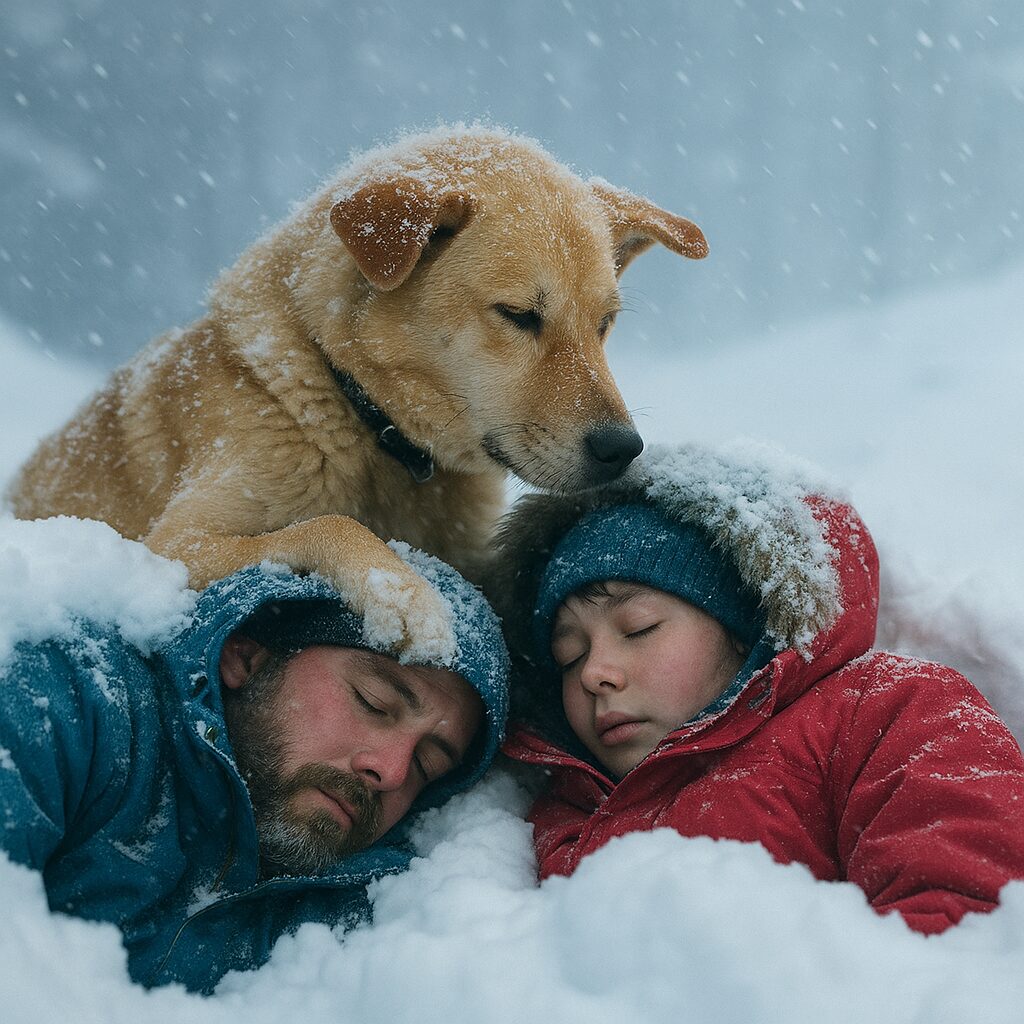The wind arrived first—a battering, low animal sound that turned the birch grove into a chorus of rattling bones. By late afternoon the mountain wore a permanent blur, a veil of snow that made near and far look the same. Somewhere inside that white, two hikers had vanished: a father in a cobalt jacket, his college-age daughter in red. Their last message was a cheerful selfie beside a trail marker. After that, only static and the kind of silence that makes people pace.
By nightfall, the village hall filled with the soft panic of winter—maps smoothed flat on tables, thermoses uncapped, radios barking numbers through the storm. The volunteer fire corps took shifts at the door. A boy in soccer cleats carried in boxes of hand warmers. On a bench by the entrance, a dog sat perfectly still, eyes half-closed as if listening to something no one else could hear.
His name was Kanta.
He wasn’t the sleek sort of hero you see on postcards. Kanta was a sturdy, golden-furred mix, somewhere between Labrador and Hokkaido-inu, with a broad chest and ears that never fully decided whether to stand or fold. His handler, a quiet woman named Minami, brushed ice from his whiskers and fastened a bell to his collar—the kind skiers wear in bear country, now chiming for a different purpose.
“Ready?” she asked.
Kanta blinked once, slow and certain. The bell gave a single silver note.
Whiteout
If you’ve never felt a Hokkaido whiteout, imagine the sky deciding it will be the ground for a while. Snowflakes come sideways and then upward, blown back by gusts that claw at your eyelids. Footprints fill in between blinks. Voices don’t travel. The mountain forgets you are there.
The searchers formed a staggered line, roped for safety, headlamps stitched into the storm like beads. Minami unclipped Kanta and pointed into the mouth of the wind. He stepped forward, head low, tail level—a working dog’s posture. This wasn’t a frantic gallop or a cinematic sprint. It was listening with the entire body.
People think rescue dogs find humans by following a single, perfect stream of scent, the way a finger traces a line on a map. In truth, scent is a weather system. It tumbles and pools and breaks apart into invisible eddies. It hides behind rocks and rides thermals and clings to fabric like small, faithful ghosts. Kanta quartered the slope, carving patient zigzags through powder that reached his shoulders. At each change of direction he looked back—a question. Minami lifted a hand—an answer. They moved like this for an hour, then two, until the storm began to feel like a long hallway with no doors.
On a narrow ridge, Kanta stopped. His tail flickered—a tiny semaphore. He raised his nose into the wind and breathed as if reading. Then he bounded off the trail and vanished chest-first into the snow.
Minami’s radio crackled. “He’s got something.”
Dig
The first bark came muffled, a thunder in a thick pillow. Then another, sharper, urgent enough to make the team break ranks and scramble. Kanta dug with a speed that was part muscle, part memory—the practiced rhythm of a dog who has torn through snow for toys and training dummies and, once before, for a life. Snow flew in high arcs behind him. He used his body as a plow. When the crust hardened, he levered it up with his shoulder. Within minutes the air around the hole tasted different—warmer, human.
A gloved hand surfaced.
Not moving.
Minami slid in next to Kanta, her own hands clawing at the drift. More shovels arrived, slicing into the drift like metronomes. The hole widened into a pocket, the pocket into a cavity. They found the father first, face gray with frost, eyes closed. The daughter lay curled against him, her own scarf pulled across his mouth—a small, genius act that may have trapped just enough warmth to matter.
Kanta stopped digging. He pressed his chest against the daughter’s back and lay across both bodies, nose against the father’s cheek. Dogs do this without being taught. They are furnaces with fur, calibrated by evolution to know when a heartbeat is failing and when heat is the only language left.
The radio coughed coordinates. The rope team anchored a sled. Someone swore softly into the wind—a prayer or a promise, it was hard to tell.
“Kanta, stay,” Minami said.
He stayed.
Minutes stretched, snapped, re-tied. A pulse—faint, then surer. A moan that might have been a name. The father’s eyelids trembled. The daughter gripped Kanta’s ruff and didn’t let go, even when they wrapped her hands in foil blankets. Under the dog’s weight, color bled back into cheeks like ink returning to a page.
Kanta’s paws bled in tiny starbursts where ice had sliced them. He did not move.
The Long Ride Down
You measure the ride by sounds: the hiss of sled runners, the chambered breaths of people who’ve run past the boundary of their own lungs, the relentless bell on Kanta’s collar keeping time like a metronome that refuses to slow.
At the trailhead, the ambulance’s doors bloomed open. Warmth hit like a wave. The paramedics took the father first, then the daughter, and Kanta jumped into the ambulance uninvited, settling with his head on the father’s knee as if he had been doing it for years.
“Sir,” the paramedic began.
“It’s okay,” Minami said, hand on the door. “He’s still working.”
They left the doors ajar long enough to rig Kanta a seat belt. He rode down the mountain staring at each face in turn, making a quiet inventory of the living.
The emergency doctor said the same phrase twice—once as a clinical observation, once as an astonishment: “Severe hypothermia, reversible.” There is poetry in that word when you’ve thought you will not see someone again. Reversible. As in un-done, unsunk, unlost.
After
Hokkaido mornings are honest. They show you exactly where the wind has been. The next day, the mountain wore a constellation of footprints that swung in toward a single point and then away again, like pilgrims who had found what they came for. The father woke to the beep of machines and the taste of metal. The daughter woke to a heavy weight across her legs and panicked until she looked down. Kanta blinked up at her, and she cried so hard the nurse had to sit her upright so she wouldn’t drown in her own relief.
News travels fast in small places. By the time Minami and Kanta walked back into the village hall, someone had set a bowl of beef next to the water dish. A child held up a crayon drawing of a golden dog with a bell that was half the size of its head. The mayor, who had come in his boots instead of his suit, produced a ribbon that had clearly been rescued from some New Year’s decoration and tied it around Kanta’s collar with fingers that refused to be as steady as he wanted them to be.
“Pride of the village,” he said, voice catching. “Our protector.”
Kanta shook once and the ribbon’s tails fluttered like small flags. He sidled into Minami’s legs and leaned until she laughed and had to catch her balance.
How a Dog Becomes a Lifeline
These are the parts of the story the news never bothers to tell, but they matter:
-
Kanta was not born a hero. He failed his first obedience class. He loved puddles more than recall and found the concept of “heel” spiritually confusing. What he did have was an appetite for work and a nose that seemed to drink the air in.
-
Minami trained quietly. Early mornings on the riverbank. Scent boxes in the shed. Friends lying under blankets in the yard while Kanta learned to find the shape of a person without relying on sight. Month after month of “again.”
-
The village invested. Not in fancy gear, but in time. Teenagers volunteered as decoys. The grocer saved scraps for training days. The community center lent its basement for rainy-day obedience drills.
-
Pain is part of the equation. Those bleeding paws? They’re preventable most days with booties and balm—but in a real rescue, dogs work until the job is done. Afterwards, Minami cleaned each cut, pressed salve into each crack, and wrapped each foot in gauze while Kanta breathed into her shoulder as if to say, “Enough for now.”
Courage looks like fireworks in movies. In real life, it looks like a dog refusing to stand up when standing up would be easier.
The Visit
Two weeks later, the father and daughter returned to the village hall with flowers and a pie that had not survived the drive. The father’s beard had been reduced to stubble by a hospital razor. The daughter wore her red jacket even indoors, as though taking it off might erase the line between then and now.
Kanta saw them and did a small, surprised double-take, like a child spotting a teacher at the supermarket. Then he trotted forward with the careful joy of someone who understands that certain reunions should be quiet. The father knelt and held Kanta’s face between his hands, and for a long moment the three of them—man, daughter, dog—simply breathed together.
“Thank you,” the father said finally, speaking into Kanta’s fur. “For her. For me. For all the days I get now.”
Minami watched with the distant, dazzled look of someone staring into sunlight. Later, when the hall had emptied, she tacked a new map to the board, not of the mountain but of the village. She drew a small pawprint near the river where Kanta liked to swim, another near the bakery where the owner slipped him crusts, a third by the school where a class had asked for a demonstration about scent and wind and patience.
“Routes of joy,” she joked, but her voice wobbled, and no one corrected her.
What the Mountain Taught
The mountain doesn’t hand out morals, but the people who go up and come down bring a few with them:
-
Listen to the quiet experts. On the night of the storm, everyone watched the radios. Minami watched the dog.
-
Prepare like it matters—because it does. Extra layers, whistles, headlamps, basic avalanche awareness, a plan someone else knows. Survival often begins before the first step.
-
Community is a rescue net you weave before you need it. Training days, donated time, shared soup, emergency drills. When the worst happens, all those ordinary stitches become a sweater you can pull over the night.
-
Love has weight. You can measure it in degrees of body heat, in how long a heartbeat holds its stubborn rhythm, in ribbon tails that flutter over a dog who lies down and refuses to move.
Epilogue: The Bell
Kanta still wears the bell. On clear days it announces his patrol through town, a bright, three-note signature that makes shopkeepers glance up and smile. On training days it chimes through the larch forest while he threads the invisible braids of scent only he can see. At night Minami takes it off and places it beside his bed, a tiny, dignified crown.
And sometimes, when the wind shifts just so, you can hear another bell in the distance—faint, urgent, like a promise. People pause, hearts pricking with the memory of that night, and then they go back to their lives—warmer, somehow, because a golden dog taught them that courage is not a pose but a posture: head low, tail steady, moving forward even when the world is nothing but white.
Kanta, pride and protector of the village. May all our mountains have such guardians.

